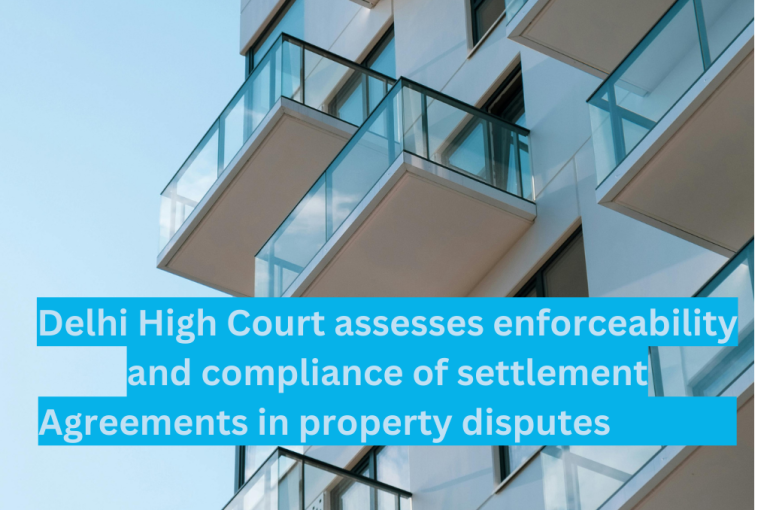DELHI HIGH COURT ASSESSES ENFORCEABILITY ANDCOMPLIANCE OF SETTLEMENT AGREEMENTS IN PROPERTY DISPUTES
This Judgment was delivered by a Single Judge Bench of the High Court of Delhi, comprising Hon’ble Justice Anup Jairam Bhambhani in the case of Daljeet Singh v. M/s. Johar Towers Pvt. Ltd. (RFA 263/2003) on 13th November 2024. The case involves Daljeet Singh (the Appellant), who has filed an appeal against the decision of the Ld. Trial Court. The dispute concerns the execution of an Agreement to sell of the third floor of a property. Daljeet Singh (the Appellant) seeks specific performance of the Agreement, asserting that the Agreement is valid and should be enforced, including the payment terms and interest stipulated in it. The case primarily focuses on the validity and enforceability of the Agreement and addresses the legal consequences of default in payment.
FACTS
Initially, the dispute in this case arose from two suits,the first Suit No. 374/1998 was filed by M/S Johar Towers Pvt. Ltd., for possession, declaration, and mesne profits concerning the third floor of property B-2/88, Safdarjung Enclave, New Delhi, and the other Suit bearingno. 25/2000, was filed by Daljeet Singh for specific performance of an Agreement to sell of the same third floor, which was executed on March 22, 1997 between both the parties. Both suits were dismissed on November 21, 2002by the Trial court which led to appeal. Later, the parties reached a settlement in 2012, under which Daljeet Singh agreed to pay ₹59,00,000(Rupees Fifty-Nine Lakhs) to Johar Towers in exchange for the execution of a sale deed for the third floor, which was to be lawfully registered. The payment was to be made by October 31, 2012, and in case the amount of Rs.59,00,000/- is not paid on or before October 31, 2012, then, from November 1, 2012 this amount of Rs.59,00,000/- will carry simple interest at 18% per annum. While Daljeet Singh tendered the payment with interest by February 2013, Johar Towers presented a sale deed that deviated from the settlement terms. The Deed referenced the absence of a sanctioned building plan, limited the floor area to 550 sq. ft. instead of the agreed 1550 sq. ft., and reserved the right to construct an additional floor. This led Daljeet Singh to argue that the sale deed violated the Settlement Agreement; hence the issue arose from disagreement from the non-fulfillment and incorrect execution of the terms of the Settlement Agreement which led to legal dispute over compliance.
ISSUES
- Whether the Respondent (Johar Towers) fulfilled its obligations under the Compromise Order dated May 24, 2012.
- Whether the Compromise Decree from May 24, 2012 could be recalled or modified based on alleged non-compliance by Johar Towers.
- Whether the absence of a sanctioned building plan for the property affects the validity of the settlement.
- Whether the Appellant’s application to recall the compromise is maintainable under CPC.
CONTENTIONS OF THE APPELLANT
Daljeet Singh contended that the Respondent, Johar Towers, failed to comply with the terms of the Settlement Agreement. Specifically, the sale deed presented by Johar Towers did not reflect the agreedupon floor area or provide a clear title to the property, as required by the Settlement Terms. Additionally, the sale deed referenced unauthorized construction without a sanctioned building plan, further violating the Settlement Terms. The Appellant also argued that a compromise decree is like a contract, which is enforceable only if the conditions agreed upon are fulfilled, He also cited relevant Supreme Court Judgments. Furthermore, Daljeet Singh claims that the Agreement was entered into under coercion. As a remedy, the Appellant seeks either the recall of the compromise or a modification of the Settlement that would direct Johar Towers to secure a sanctioned building plan and fully comply with the terms of the Settlement.
CONTENTIONS OF THE RESPONDENT
Johar Towers, the Respondent, raised preliminary objections; they argued that the Application under Order XLIII Rule 1A of the Civil Procedure Code (CPC) is not maintainable. They also asserted that challenges to compromise decrees should be made through an appeal, not an application. Furthermore, the Respondent contends that Daljeet Singh only challenged the decree in one of the two appeals, leaving the other decree to operate as res judicata, thereby preventing further litigation on the same matter. On the merits of the case, Johar Towers defended its position by claiming compliance with the Settlement Terms., attributing any perceived non-compliance to Daljeet Singh’s own delays and unreasonable demands. The Respondent also points out that the unauthorized construction mentioned in the sale deed could be regularized under the Municipal Corporation of Delhi’s (MCD) floor-wise policy, which would make the property legally transferable.
DECISION OF DELHI HIGH COURT
The Hon’ble High Court first examined the maintainability of the Application under Order XLIII Rule 1A of the CPC, considering whether it was the proper legal mechanism to challenge the compromise decree. The Hon’ble Court emphasized the need for procedural correctness, referencing Sri Gangai Vinayagar Temple v. Meenakshi Ammal(AIRONLINE 2014 SC 174)to support its reasoning. On the merits of the case, the Hon’ble Court noted discrepancies between Settlement Terms and the sale deed proposed by Johar Towers, particularly the absence of a sanctioned building plan and the reduction in floor area. The delay in seeking relief by the Appellant, which was 3717 days, was also highlighted, with the Hon’ble Court considering whether this delay prejudiced the Respondent’s rights. Additionally, the Hon’ble Bench considered the Municipal Corporation of Delhi’s (MCD) status report, which confirmed that the unauthorized construction could be regularized under the MCD’s floor-wise policy, suggesting that there was still a possibility for compliance by the Respondent.
CONCLUSION
The Hon’ble Court dismissed the Application to recall the compromise decree, upholding the Compromise Order dated 24.05.2012. However, it directed Johar Towers to comply with procedural requirements, including securing a sanctioned plan, as part of execution proceedings. The Court reiterated the binding nature of compromise decrees but stressed the necessity of good faith in compliance.
Arjav Jain
Associate
The Indian Lawyer & Allied Services





































Leave a Reply